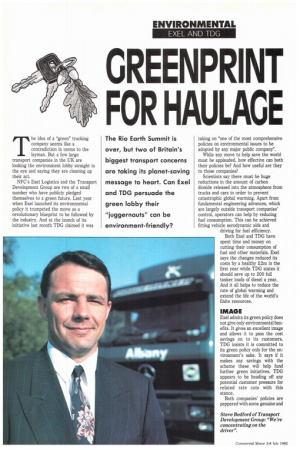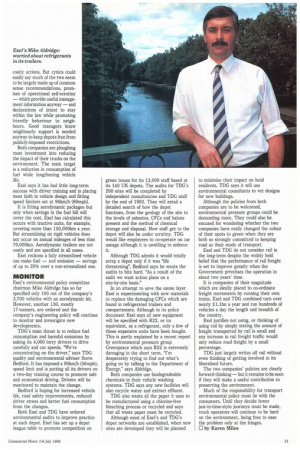GREENPRINT FOR HAULAGE
Page 32

Page 33

If you've noticed an error in this article please click here to report it so we can fix it.
The idea of a "green" trucking company seems like a contradiction in terms to the layman. But a few large transport companies in the UK are looking the environment lobby straight in the eye and saying they are cleaning up their act.
NFC's Exel Logistics and the Transport Development Group are two of a small number who have publicly pledged themselves to a green future. Last year when Exel launched its environmental policy it trumpeted the move as a revolutionary blueprint to be followed by the industry. And at the launch of its initiative last month TDG claimed it was taking on "one of the most comprehensive policies on environmental issues to be adopted by any major public company".
While any move to help save the world must be applauded, how effective can both their policies be? And how useful are they to those companies?
Scientists say there must be huge reductions in the amount of carbon dioxide released into the atmosphere from trucks and cars in order to prevent catastrophic global warming. Apart from fundamental engineering advances, which are largely outside transport companies' control, operators can help by reducing fuel consumption. This can be achieved fitting vehicle aerodynamic aids and driving for fuel efficiency.
Both Exel and TDG have spent time and money on cutting their consumption of fuel and other materials. Exel says the changes reduced its costs by a healthy £2m in the first year while TDG states it should save up to 200 full tanker loads of diesel a year. And it all helps to reduce the rate of global warming and extend the life of the world's finite resources.
IMAGE Exel admits its green policy does not give only environmental benefits. It gives an excellent image and allows it to pass the cost savings on to its customers. TDG insists it is committed to its green policy only for the environment's sake. It says if it makes any savings with the scheme these will help fund further green initiatives. TDG appears to be heading off any potential customer pressure for related rate cuts with this stance.
Both companies' policies are peppered with some genuine and costly actions. But cynics could easily say much of the two seem to be largely made up of common sense recommendations, promises of operational self-scrutiny — which provide useful management information anyway — and declarations of intent to stay within the law while promoting friendly behaviour to neighbours. Good managers know neighbourly support is needed ,anyway to keep depots free from publicly-imposed restrictions.
Both companies are ploughing most investment into reducing the impact of their trucks on the environment. The main target is a reduction in consumption of fuel while lengthening vehicle life.
Exel says it has had little long-term success with driver training and is placing most faith in vehicle design and fitting speed limiters set at 961srn/h (60mph).
It is fitting aerodynamic packages but only when savings in the fuel bill will cover the cost. Exel has calculated this occurs with tractive units, for example, covering more than 150,000km a year. But streamlining on rigid vehicles does not occur on annual mileages of less than 70,000km. Aerodynamic trailers are not costly and are specified in all cases.
Exel reckons a fully streamlined vehicle can make fuel — and emission — savings of up to 20% over a non-streamlined one.
MONITOR
Exel's environmental policy committee chairman Mike Aldridge has so far specified only 100 out of the company's 3,700 vehicles with an aerodynamic kit. However, another 130, mostly 17-tonners, are ordered and the company's engineering policy will continue to monitor and investigate new developments.
TDG's main thrust is to reduce fuel consumption and harmful emissions by asking its 4,000 lorry drivers to drive carefully and cut speeds. "We're concentrating on the driver," says TDG quality and environmental adviser Steve Bedford. It has imposed a 90km/h (56mph), speed limit and is putting all its drivers on a two-day training course to promote safe and economical driving. Drivers will be monitored to maintain the change.
Bedford is hoping for increased vehicle life, road safety improvements, reduced driver stress and better fuel consumption from the changes.
Both Exel and TDG have ordered environmental audits to improve practice at each depot. Exel has set up a depot league table to promote competition on green issues for its 13,000 staff based at its 140 UK depots. The audits for TDG's 200 sites will be completed by independent consultancies and TDG staff by the end of 1992. They will entail a detailed search of how the depot functions, from the geology of the site to the levels of asbestos, CFCs and halons present and the method of chemical storage and disposal. How staff get to the depot will also be under scrutiny. TDG would like employees to co-operate on car useage although it is unwilling to enforce it.
Although TDG admits it would totally scrap a depot only if it was "life threatening", Bedford says he wants the audits to bite hard. "As a result of the audit we want action plans on a site-by-site basis."
In an attempt to save the ozone layer Exel is experimenting with new materials to replace the damaging CFCs which are found in refrigerated trailers and compartments. Although in its policy document Exel says all new equipment will be specified with R22, or its equivalent, as a refrigerant, only a few of these expensive units have been bought. This is partly explained by a recent report by environmental pressure group Greenpeace which says R22 is extremely damaging in the short term. "I'm desperately trying to find out what's going on by talking to the Department of Energy," says Aldridge.
Both companies use biodegradeable chemicals in their vehicle washing systems. TDG says any new facilities will also recycle water and extract effluent.
TDG also wants all the paper it uses to be manufactured using a chlorine-free bleaching process or recycled and says that all waste paper must be recycled.
Although most of Exel's and TDG's depot networks are established, when new sites are developed they will be planned to minimise their impact on local residents. TDG says it will use environmental consultants to vet designs for new buildings.
Although the policies from both companies are to be welcomed, environmental pressure groups could be demanding more. They could also be excused for wondering whether the two companies have really changed the colour of their spots to green when they are both so strongly committed to keeping road as their mode of transport.
Exel and TDG do not consider rail in the long-term despite the widely held belief that the performance of rail freight is set to improve greatly when the Government privatises the operation in about two years' time.
It is companies of their magnitude which are ideally placed to co-ordinate freight movements by running their own trains. Exel and TDG combined turn over nearly £1.1 bn a year and run hundreds of vehicles a day the length and breadth of the country.
Exel justifies not using, or thinking of using rail by simply stating the amount of freight transported by rail is small and any increase in rail freight traffic would only reduce road freight by a small percentage.
TDG just largely writes off rail without even thinking of getting involved in its liberalised future.
The two companies' policies are clearly forward-thinking — but it remains to be seen if they will make a useful contribution to preserving the environment.
Much of the responsibility for transport environmental policy must lie with the consumers. Until they decide fewer just-in-time-style journeys must be made, truck operators will continue to be hard on the environment, being free to ease the problem only at the fringes.
0 by Karen Miles
















































































